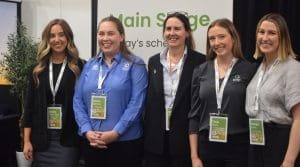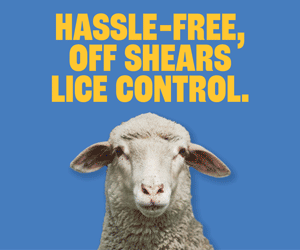
Trailerblazer finalists Bobbie Lewis Baida, Bianca Agenbag, Coles livestock innovation and sustainability manager Maria Crawford, Tayla Blight and Georgia Welch.
RESEARCH into the management and causes of heat stress in livestock has been recognised, with a University of Adelaide PhD candidate taking out the Trailblazer award at this year’s LambEx conference.
Bobbie Lewis Baida is hoping to identify the traits related to heat stress and put it into a dedicated heat tolerance breeding value. Ms Lewis Baida is nearing the end of a PhD project investigating the impacts of heat and thermoregulation, on the fertility of extensively grazed sheep.
The project finished ahead of five other pitches in this year’s Coles Trailblazer competition, which aims to recognise young innovators in the industry. Entrants between the age of 16-30 were asked to pitch research ideas, which were then put to a panel of judges.
Correlating methane reducing feed additives to water quality, developing a flystrike vaccine, creating an app to help with worm management, adapting embryo research to lambing percentages and research into the impact of using shrubs and trees for shade were all part of the entries that made the finals.
In presenting her idea to LambEx, Ms Lewis Baida said there were many factors that make up heat resilient livestock – including breeding, metabolic efficiency and the ability to make smarter decisions in the heat, like seeking shade.
However, she said the main physiological driver was the ability to maintain core temperature within the normal range. A trait she said was becoming more important for the industry.
“Sheep here in Australia are exposed to high temperatures more frequently and for longer durations,” Ms Lewis Baida said.
“Under the current climate, heat stress at joining was reported to result in the loss of well over 2m lambs, equating to about $120m annually.”
Ms Lewis Baida said creating more resilient sheep was likely to increase fertility in flocks.
 “We all know the best way to increase profit in any sheep enterprises is to get more lambs on the ground and have them survive through to weaning,” she said.
“We all know the best way to increase profit in any sheep enterprises is to get more lambs on the ground and have them survive through to weaning,” she said.
“Studies have shown that ewes and rams that maintain a lower core body temperature and cope better under harsh summer joining conditions also perform better.
“Cool ewes equals more lambs.”
In completing her PhD studies, Ms Lewis Baida has been using technology to monitor the core temperatures of both ewes and rams, what it is doing under grazing conditions and how it impacts fertility. GPS tracking technology has also been used to see how sheep use shade and other resources in paddocks.
“We have found a tremendous amount of variation in their ability to cope with hot conditions,” she said.
Ms Lewis Baida said she had been asked about whether producers selecting for reproductive efficiency are indirectly selecting for heat resistance. She said while it was a good point, she believed there were some differences in the traits.
“I don’t believe that if a ewe performs well under one joining that she is necessarily more heat resilient and it doesn’t mean she will perform the same under harsh summer conditions,” she said.
While the goal is to form an Australian Sheep Breeding Value for heat stress, Ms Lewis Baida was also looking to identify markers that are more easily measured than the trait itself.
Other projects reaching the top
Five other Trailblazer entrants were brought to LambEx where they were interviewed and questioned about their pitches.
Three entrants were then chosen to present their pitches to the LambEx crowd.
University of Adelaide PhD student Bianca Agenbag presented her research into the impact of water quality on feeding methane reducing feed additives.
Murdoch University PhD student gave an insight into her research looking at the impact of natural shade on lambing percentages.
Whole there were three official finalists, the panel of six also voted on their favourite pitch. South Australian vet Jordan Ackland’s app used to improve worm management was voted the most popular.
Taylor Blight from Clare in SA won the junior Trailblazer competition.

HAVE YOUR SAY